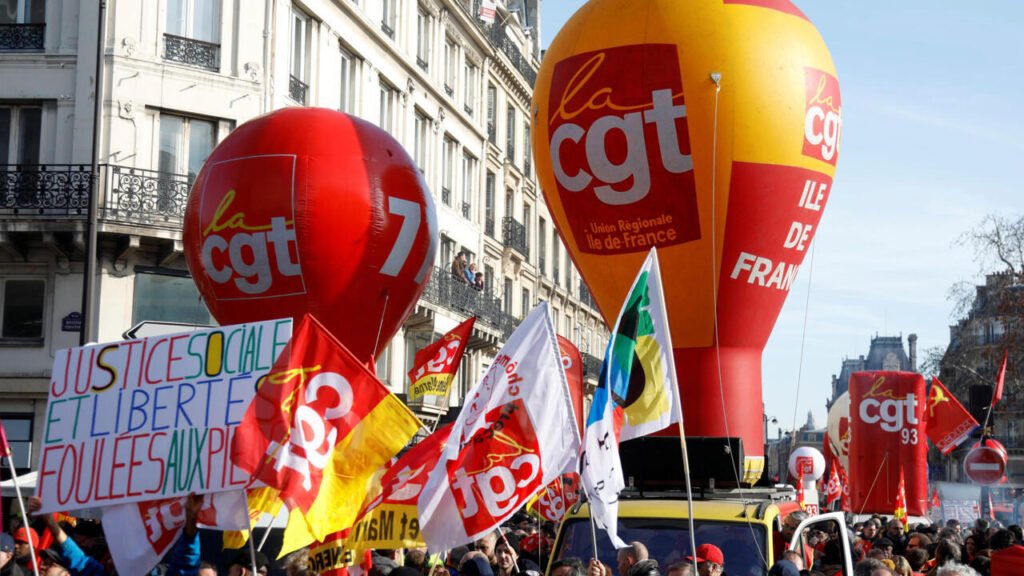France’s capitalist framework is now confronting a profound crisis marked by widespread job losses. High-profile companies such as Michelin, Auchan, and ArcelorMittal are leading a surge of factory closures and redundancy announcements. The General Confederation of Labour (CGT) has warned that approximately 150,000 industrial jobs are at imminent risk. These closures trigger a domino effect, bankrupting suppliers and subcontractors or forcing them to downsize.
Simultaneously, small and medium-sized enterprises (SMEs) are being battered by a general economic downturn. Since January 2024, an alarming 66,800 bankruptcies have occurred, exceeding the previous peak recorded in 2010. Rising energy costs and shrinking demand have left countless SMEs unable to repay state-backed loans granted during the pandemic.

In September, the Banque de France revised its 2024 growth forecast down to a modest 1.1 percent, with an equally tepid projection of 1.2 percent for 2025. However, these figures fail to reflect the current wave of bankruptcies and layoffs. Combined with planned budget cuts amounting to tens of billions of euros, rising unemployment will likely suppress demand further, exacerbating economic stagnation. The Barnier government risks facing a motion of censure in the National Assembly, which could ignite widespread social unrest.
Mounting Public Debt and Austerity
The French bourgeoisie, driven by the need to safeguard class interests, sees no alternative but to adopt severe austerity measures to curb the soaring public deficit, projected to exceed 6 percent of GDP in 2024. With public debt surpassing €3.2 trillion, the government is expected to borrow an additional €300 billion by 2025.

The dissolution of the National Assembly in June 2024 has worsened France’s debt-financing conditions. Nations such as Spain and Portugal now secure loans at more favorable rates than France. By 2025, interest payments on French public debt could soar to €55 billion, escalating to €70 billion in 2027 and nearly €100 billion by 2028. For context, the 2024 national education budget stood at €63 billion.
In October, Fitch and Moody’s assigned a negative outlook to France’s debt rating. Moody’s attributed its decision to the nation’s politically fragmented environment, which undermines the consensus necessary to implement sustainable fiscal reforms. This reflects the deeper systemic crisis within French capitalism, as traditional mechanisms of bourgeois governance falter.
Political and Social Tensions
French capitalism now finds itself in a precarious state. The Michel Barnier government, representing a party with less than seven percent of the vote, struggles to maintain its footing. Constant negotiations with rival factions within its fragile coalition and with the right-wing opposition, Rassemblement National (RN), further weaken its position. Although RN has thus far refrained from supporting motions of censure proposed by the New Popular Front (NFP), mounting discontent among its voter base may alter its stance.
Social unrest is simmering across the nation. Strikes erupted in October within the health insurance sector to oppose proposed €4.9 billion cuts in the Social Security Finance Bill (PLFSS). Hospitals remain on strike, demanding increased resources, while child care workers and civil service unions are planning industrial action in December. Additionally, railway unions are preparing an indefinite strike from December 11 to protest the dismantling of freight services.
France also witnessed a powerful agricultural revolt in early 2024, part of a broader European movement. However, stagnant conditions have reignited these protests, while factory closures and layoffs in industries such as metals, automotive, and chemicals have prompted indefinite strikes.

Leadership Challenges in the Labour Movement
The unfolding crisis necessitates a decisive and militant response from the working class. Unfortunately, current leadership appears unequal to the task. France Insoumise, rather than mobilizing grassroots movements, has confined itself to futile parliamentary maneuvers. Meanwhile, the CGT leadership’s call for a “moratorium on redundancies” fails to address the urgency of the situation.
The CGT has organized a “day of convergence for all struggles” on December 12, but isolated one-off actions have historically fallen short. For instance, the movement against pension reform in 2023, despite mass support, succumbed to defeat due to a lack of unified and sustained strikes.

Unité CGT
Since 2019, the left-wing faction within the CGT, Unité CGT, has been advocating for a comprehensive program of indefinite strikes. This faction gained prominence during the CGT congress in March 2023 by rejecting the outgoing leadership’s performance report—a landmark event in CGT history.
Unité CGT proposes a bold alternative: the expropriation and nationalization of major industrial groups under workers’ control. This program has the potential to galvanize millions of workers affected by austerity and job losses. However, to achieve this vision, Unité CGT must confront the moderate leadership of Sophie Binet and push for a transformative strategy within the CGT.
Now is the time for a resolute battle to empower the labor movement with the leadership and strategies it needs to confront the intensifying crisis. Only through such determination can the working class mount an effective resistance to the austerity policies threatening their livelihoods.

